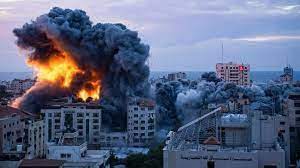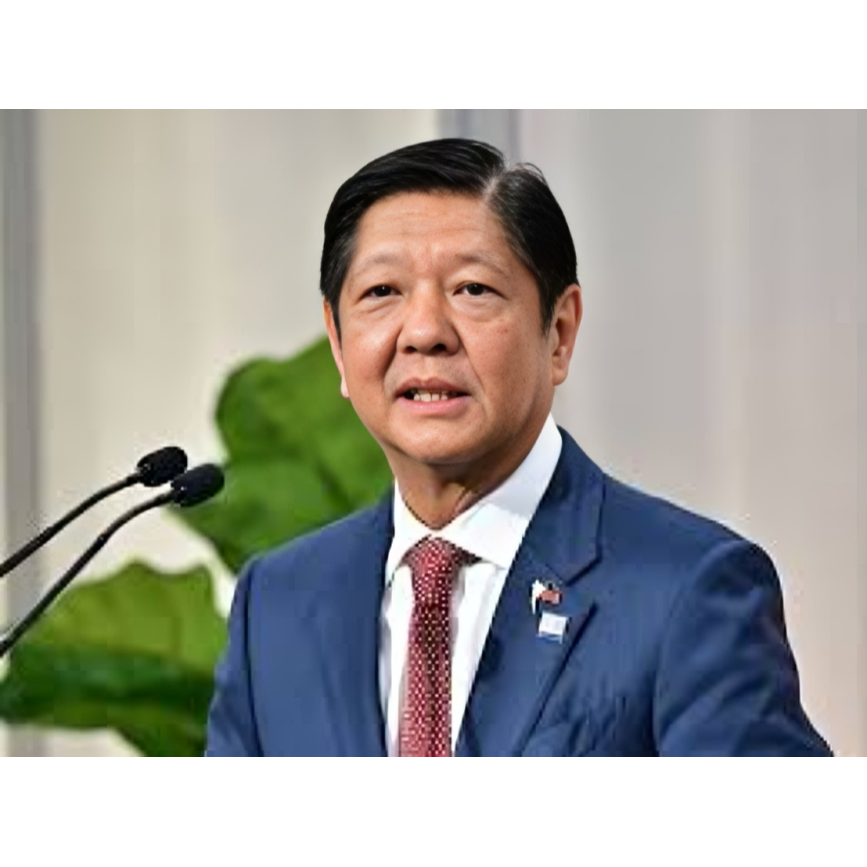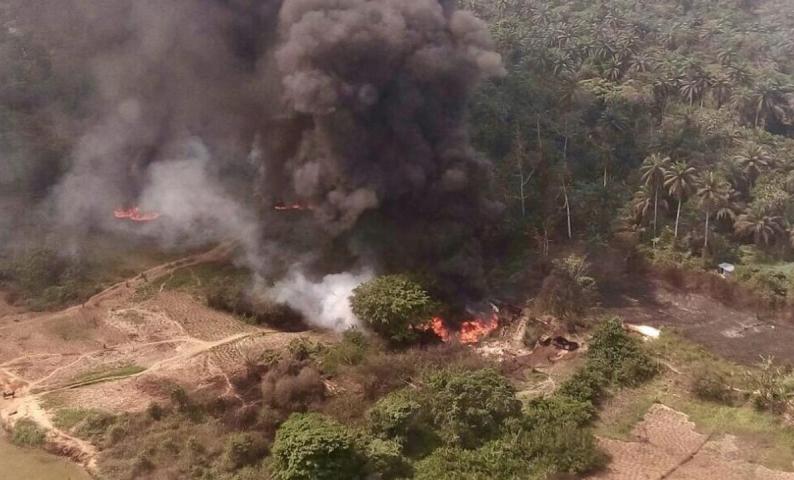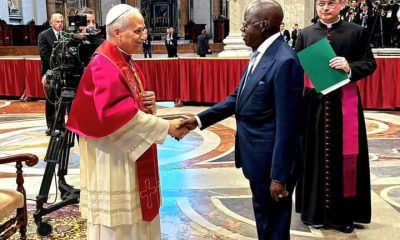Foreign News
Nigeria, other UN Member States Adopt Gaza Resolution, Calling for “Humanitarian Truce”

….Humanitarian Truce
Nigeria and 119 Members States on Friday voted in favour of a resolution calling for an “immediate durable and sustained humanitarian truce” between Israeli forces and Hams militants in Gaza.
It also demands continuous, sufficient and unhindered” provision of lifesaving supplies and services for civilians trapped inside the enclave, as news reports suggest Israel has expanded ground operations and intensified it bombing campaign.
The resolution drafted by Jordan secured 120 votes, 14 against and 45 abstentions.
The resolution adopted is a non-binding expression of the majority view of UN Member States.
However, it marks the first formal response of the UN to the hostilities since the Hamas terror attacks of October 7, after the Security Council failed on four occasions to reach consensus on any action.
An amendment, proposed by Canada and backed by over 35 Member States, including the U.S., seeking an explicit condemnation of Hamas, did not pass, failing to get two-thirds support.
Countries put forward arguments for and against the amendment, and explained their positions on the adopted resolution
Earlier, several countries took the floor, reiterating the impact of the crisis on civilians and underscoring the imperative to ensure aid finally flows into the enclave as supplies of food, water and fuel reach critically low levels
The U.S. declared that after the current crisis is over, “there is no going back to the status quo, as it stood on October 6”, noting the importance of a two-State solution.
Jordan’s UN Ambassador Mahmoud Hmoud while speaking had called for action on the resolution because of the urgency of the escalating situation on the ground.
While council resolutions are legally binding, assembly resolutions are not, but they do serve as a barometer of world opinion.
Ghana’s Ambassador and Deputy Permanent Representative Carolyn Oppong-Ntir, said her delegation voted in favour of the resolution because, among other reasons, the humanitarian crisis could not be ignored.
“We have a responsibility as an international community to help end the heart-breaking tragedies” in Israel and Palestine, she said.
“Out of this tragedy, we must find the fierce agency to support the two parties to resume and conclude a peace agreement” and advance the two-State solution.
She said her country – a current Security Council member – voted in favour of the resolution because, among other reasons, the humanitarian crisis could not be ignored.
“We have a responsibility as an international community to help end the heart-breaking tragedies” in Israel and Palestine, she said.
“Out of this tragedy, we must find the fierce agency to support the two parties to resume and conclude a peace agreement” and advance the two-State solution.
Similarly, France’s Ambassador Nicolas de Rivière speaking after the resolution passed, said his delegation voted in favour, as “nothing justifies the killing of civilians”.
“We have to work collectively to set up a humanitarian truce because the situation in Gaza is catastrophic,” he said, noting that France has already sent an aid vessel. “The Assembly must call for the release of hostages.”
However, the adoption of this resolution cannot replace the Security Council’s efforts nor the decisions that the organ must now adopt, he said, expressing hope that the Council can reach a decision.
“We have a duty to prevent a worsening of the situation,” he said. “The only viable solution is a two-State solution.”
Meanwhile, Gilad Erdan, Ambassador of Israel to the UN, said in response to the resolution passing that “today is a day that will go down in infamy”.
“We have all witnessed that the UN holds not even one ounce of legitimacy,” he said. “The UN is committed to ensuring further atrocity.
According to the family of nations, Israel has no right to defend itself.”
There are no talks or discussions to be held with Hamas, he said, adding that Israel will not sit idly by to let them commit atrocities again. The resolution does not mention Hamas once, as if the war started on its own.
“What is going on here?” he asked, questioning whether the goal was to tie Israel’s hands. “The only way to destroy Hamas is to root them out. Why are you not holding Hamas accountable?”
“We know there is no humanitarian crisis in accordance with international humanitarian law,” he said, noting that every statistic comes from Hamas about information about Gaza.
Anyone interested in preventing violence should call on Hamas to lay down their arms, turn themselves in and return all hostages, he said.
“If this were to happen, the war would end immediately,” he said.
“This is a dark day for the UN and mankind. Israel will defend itself and will do what must be done to eradicate Hamas’ capabilities and bring the hostages home.”
NAN reports that the Emergency Special Session will continue on Tuesday. (NAN)
Foreign News
Philippine President Calls for Resignation of All Cabinet Secretaries

Philippine President Ferdinand Marcos Jr. has asked all of his Cabinet secretaries to submit their resignations on Thursday in what he called a “bold reset” of his administration following last week’s mid-term elections.
The elections saw more opposition candidates win crucial Senate seats, signaling shifting political tides.
Marcos, the 67-year-old son of the late Philippine dictator overthrown in 1986, won the presidency in a landslide in 2022, a stunning political comeback marked by a call for national unity.
However, his vice-presidential running mate, Sara Duterte, also widely popular, later distanced herself from Marcos in a falling-out that had sparked intense political discord.
Marcos had since emerged as one of the region’s most vocal critics of China’s aggression in the disputed South China Sea, bolstered by support from the United States and other allies. Domestically, he continued to face significant challenges, including high inflation, unfulfilled promises to lower rice prices, and growing concerns over kidnappings and other crimes.
“This is not business as usual,” Marcos said in a government statement.
“The people have spoken and they expect results, not politics, not excuses. We hear them and we will act.” (AP/NAN)
Foreign News
Pakistan Blames India for School Bus Attack That Killed 5

Three children and two adults were killed in a blast on Wednesday that targeted a school bus in south-western Pakistan, with Islamabad blaming India for the attack.
Terrorists targeted the bus in the city of Khuzdar, in the restive province of Balochistan, as it took students to a military-run school, Balochistan Chief Minister Sarfraz Bugti said.
Preliminary findings suggested that it was not a suicide attack, he said at a press conference.
The dead included three young girls who were students of grades 6, 7 and 10. More than 40 students were wounded, many of them said to be suffering severe wounds.
Bugti said that his government had intelligence reports that Indian National Security Advisor Ajit Doval was planning something in Balochistan but did not expect him to target innocent children.
“After facing a humiliating defeat on the battlefield, India has resorted to despicable and cowardly acts,” the media wing of Pakistan’s military said in a statement.
“Planners, abettors and executors of this cowardly Indian sponsored attack will be hunted down and brought to justice and heinous face of India will be exposed in front of the entire world,” the statement added.
Prime Minister Shehbaz Sharif will make an emergency visit to the province where he would be briefed on the attack by terrorists, allegedly backed by India, said a statement issued by his office.
The Baloch Liberation Army (BLA), a rebel group fighting for the independence of the region from Pakistan, earlier claimed it targeted the bus, but said it was transporting the soldiers.
Islamabad claims that the BLA is backed by India.
Violence orchestrated by sub-nationalist rebels has surged in Balochistan, a region that borders both Afghanistan and Iran, and is a hub of Chinese investment and connectivity projects.
Earlier this month, India and Pakistan carried out tit-for-tat drone, missile and airstrikes targeting each other’s military installations and airbases.
The nuclear-armed rivals agreed to the ceasefire on May 10 but continue to accuse each other for terror incidents. (dpa/NAN)
Foreign News
Thousands Protest in Pakistan After Drone Strike Kills 4 Children

Thousands of people in north-west Pakistan on Tuesday blocked a highway by placing the coffins of four children who were killed by a suspected drone strike.
The protests in the Mir Ali area of North Waziristan region began earlier on Monday after a family home was hit, local resident Mohamed Jamal Dawar said.
It is not clear who was behind the incident.
Local activist Zahid Wazir said the drone was operated by the Pakistani military.
He said the home was likely mistaken as a hideout used by Islamist militants.
Pakistani intelligence officials said the explosives were fired by a quadcopter that was being operated by the Taliban militants to target a nearby military post, but that it missed the target.
An independent verification was not possible as the region is inaccessible to outsiders.
Activists of a local rights group, the Pashtun Tahafuz Movement, which is against the militarisation of the region by both the military and the Pakistani Taliban, vowed to continue the protest.
“We will continue to demand justice for our kids,” Wazir said.
The Pakistani military and Islamist militants have been fighting each other in the region for more than two decades.
More than 80,000 Pakistanis, an overwhelming majority of civilians, have lost their lives in years of violence. (dpa/NAN)




















